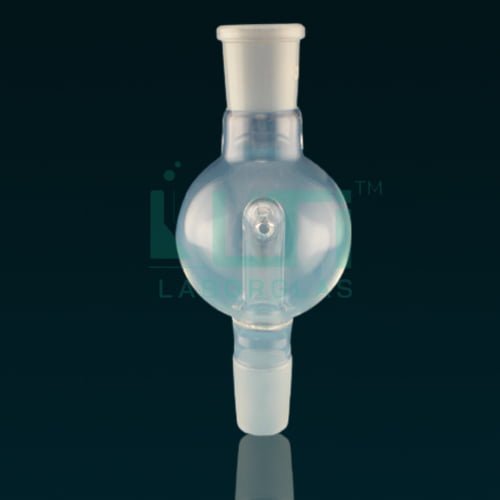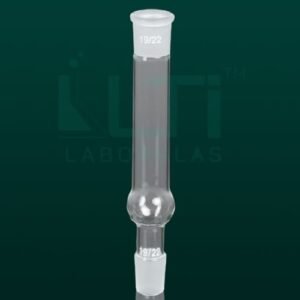- For use with rotary evaporators
- Prevents contents of the flask from being drawn into condenser
- Modified bump traps provide expanded volume from reaction that have tendency of excessive foam
| PART No. | CAP(ml) | NS FEMALESIZE | NS MALE SIZE | Pack(Qty) |
| 2530-29F19M | 150 | 29/32 | 19/26 | 10 |
| 2530-29F24M | 150 | 29/32 | 24/29 | 10 |
| 2530-29F29M | 150 | 29/32 | 29/32 | 10 |
Here are some common uses for a Splash Head in a rotary evaporator setup in a laboratory:
- Rotary Evaporation: The primary purpose of a splash head in a rotary evaporator is to prevent liquid samples from splashing into the condenser. It helps maintain a controlled and efficient evaporation process by directing the vapor into the condenser while preventing liquid carryover.
- Solvent Recovery: In applications where the goal is to recover solvents through rotary evaporation, a splash head helps prevent loss of solvent due to splashing or carryover, ensuring that the recovered liquid is pure.
- Concentration of Samples: Splash heads are particularly useful when concentrating liquid samples using a rotary evaporator. They contribute to the controlled evaporation of the solvent, allowing for the concentration of the sample.
- Reflux Setups: In certain rotary evaporation configurations, a reflux setup may be used. A splash head can help control the refluxed vapors and prevent splashing or carryover during the process.
- High-Boiling Point Solvents: When working with high-boiling point solvents or samples prone to foaming, a splash head becomes crucial in maintaining a smooth and controlled evaporation without the risk of contaminating the condenser or vacuum system.
- Laboratory Safety: The use of a splash head contributes to laboratory safety by preventing liquid splashing, which could otherwise pose a risk to researchers and compromise the integrity of the experiment.
- Vacuum Integrity: By preventing splashing or foaming, a splash head helps maintain the integrity of the vacuum system in the rotary evaporator, ensuring efficient and continuous evaporation.







